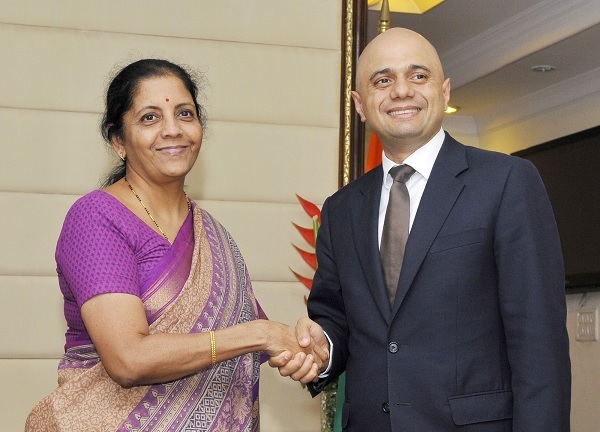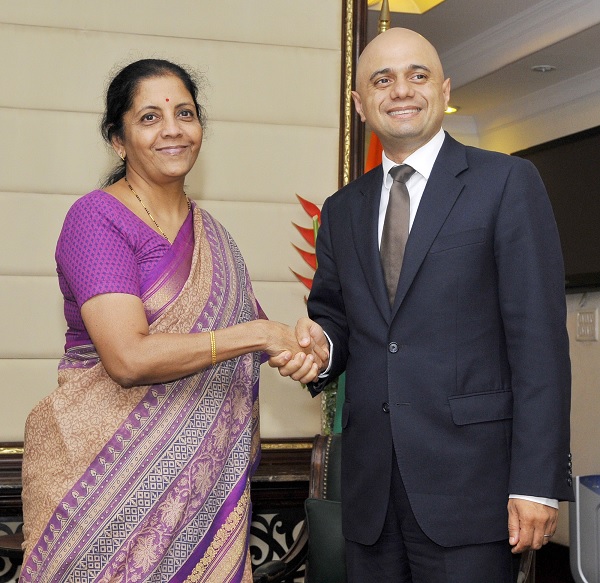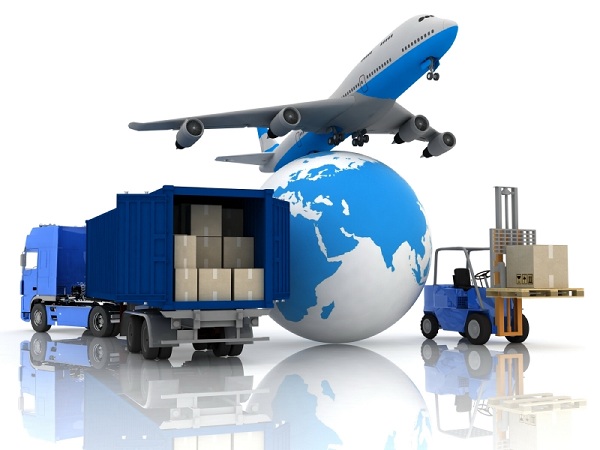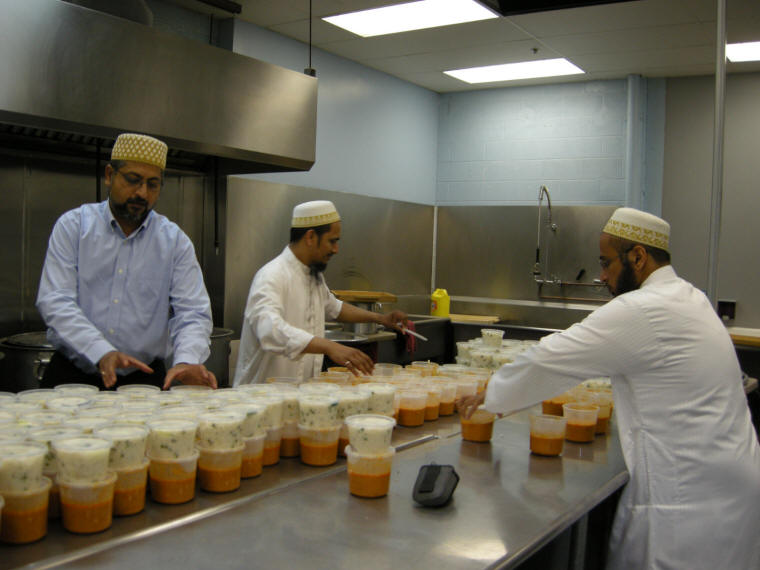
by Editor | May 25, 2021 | Corporate, Corporate Governance

MP, Secretary of state for Business, Innovation and Skill, U.K. Sajid Javid meeting the Minister of State for Commerce & Industry (Independent Charge) Nirmala Sitharaman, in New Delhi
New Delhi:(IANS) Post its June referendum to leave the European Union, Britain on Friday initiated the process of recasting its trade relations with India dating to colonial times with a meeting here between British Business Secretary Sajid Javid and Indian Commerce Minister Nirmala Sitharaman.
“Post Brexit (vote to exit EU), the UK Business Minister has now made the outreach to India, informally, now with this visit here. We are happy to engage niformally with the UK on trade and investment,” Sitharaman told reporters here after meeting Javid.
“These talks will have to be followed-up step by step, then formalised, before we can indicate whether we are looking at a preferential trade agreement (PTA) or a free trade agreement,” she said.
Noting that Britain was a “major component of our trade with the EU”, Sitharaman said that she has invited the chief negotiatiors from both sides to start the process of informal negotiations.
“Having recognised Brexit has happened, the talks on a trade agreement have to start afresh. There is great potential for goods and services trade between India and the UK, and services in particular with us being a member of the Commonwealth,” she added.
Javid told reporters: “We had very positive and constructive discussions and are ready to build on the constructive releationship that the UK and India already have.”
Britain accounts for 15 per cent of India’s total merchandise trade. It is also the third largest inward investor into India, after Mauritius and Singapore, with cumulative foreign direct investment (FDI) equity investments of $22.7 billion (from April 2000 to December 2015), or eight per cent of the total FDI inflows.
In turn, India is the third largest investor, based on the number of projects, into Britain.
Sitharaman also said negotiations would continue for an FTA with the European Union.
Javid however declined to take queries regarding his meeting earlier on Friday in Mumbai with Tata Sons chairman Cyrus Mistry along with Tata Steel top brass on the issue of the company’s proposed sale of its steel assets in Britain.

by Editor | May 25, 2021 | Business

New Delhi:(IANS) Prime Minister Narendra Modi on Saturday called for higher ethanol content in petrol and a concerted effort to push exports in a bid to lower the current sugar surplus and protect the interests of farmers to whom factories owe an estimated Rs.15,000 crore in cane arrears.
“Taking note of the current supply-demand issues with regard to sugar, the prime minister called for assiduous efforts to increase ethanol blending of fuel. He also called for exploring all possibilities for export of sugar,” an official statement said, after a high-level meeting here.
“The prime minister also reviewed the progress with regard to the Rs.6,000 crore incentive package approved by the union government in June 2015,” the statement added, referring to the soft loan extended to sugar mills so that they can clear the arrears to farmers.
“The prime minister emphasized that the farmers’ interest be kept foremost at all times and issues related to sugar sector be monitored regularly. Long-term measures with regard to the sector were also discussed.”
Among those at the meeting were Finance Minister Arun Jaitley, Agriculture Minister Radha Mohan Singh, Food Minister Ram Vilas Paswan and Commerce Minister Nirmala Sitharaman, besides senior officials from their ministries, Niti Aayog and the Prime Minister’s Office.
The meeting also came against the backdrop of the Indian Sugar Mills Association (ISMA) estimating the sugar production during the sugar season 2014-15 (October to September) at 28.3 million tonnes and another 28 million tonnes in the next season, besides a carry over of 10 million tonnes.
As a result, supplies have outstripped demand for the fifth straight year. The annual demand is around 25-26 million tonnes.
The sugar mills have warned that if the surplus stocks are not reduced, they may be forced not to start crushing cane in the upcoming season, beginning October 1. But analysts feel the situation was unlikely to improve soon.
“ICRA expects that given the continued sugar surplus scenario in the domestic market and limited possibility of exports in face of falling international sugar prices, domestic sugar prices will continue to remain under pressure in the near term,” aid the ratings agency in its latest report.
“Sugar mills are likely to liquidate their sugar stocks at low prices following pressure from various state governments to clear the high cane arrears,” it said, while also adding: “Government support and rationalization of cane prices will be key factors for restoring the financial health of sugar industry.”
In the past few months, besides the soft loan of Rs.6,000 crore, the government has raised the import duty on sugar from 15 to 40 percent, increased the export subsidy to Rs.4,000 per tonne and raised the level of ethanol blending in petrol to 10 percent.
The government also allowed the export of additional 2,095 tons of raw sugar to the US under the tariff rate quota, under which imports there attract a relatively lower customs duty. Prior to that, 8,424 tonnes of raw sugar had been notified for export to the US.

by Editor | May 25, 2021 | Halal Food, Halal Industries

Bohra Community Kitchen -Food Distribution (File Photo,Maeeshat)
New Delhi:(IANS) India is working with the WTO members for a permanent solution to the problem of public stockholding for food security purposes, or the “subsidy cap issue”, parliament was informed on Wednesday.
The World Trade Organisation General Council’s November 2014 decision in the matter “also includes a commitment to find a permanent solution by December 31, 2015, on a best endeavour basis and a firm commitment to engage in negotiations for this purpose through an intensified programme of work”, Commerce Minister Nirmala Sitharaman told the Rajya Sabha in a written reply.
“The General Council adopted a decision in November 2014, making it clear that WTO members will not challenge the public stockholding programmes of developing country members for food security purposes, and the peace clause will remain in place in perpetuity until a permanent solution has been agreed and adopted,” she added.
The WTO agreement on public stock holding, paved the way for signing the trade facilitation agreement (TFA) for easing global custom rules.
The TFA, approved by 160 WTO members last year, aims to streamline and harmonise customs procedures to bring an estimated saving of over $1 trillion annually.
An agreement between India and the US earlier opened the way for a consensus on the TFA which had eluded the WTO members.
India has asked for a permanent solution to the issue of public stockholding for food security purposes and not restricted for a period of four years as decided earlier during the WTO ministerial meeting in Bali, Indonesia, last year.
India has been under pressure from several countries, particularly the US, to drop its objections to the TFA.
India’s objections are on the WTO limits on agriculture subsidies at 10 percent of the total value of foodgrains production, and on stockpiling them. Complying with the Food Security Act passed in 2013 that guarantees subsidised foodgrains to around 70 percent of the population could result in breaching these limits leading to penalties for India.
Members also agreed on what is called the “peace clause”, that till 2017 no country can move to the dispute settlement body of the WTO against another member if its government was found to be breaching the level of subsidy freeze that was permitted.




